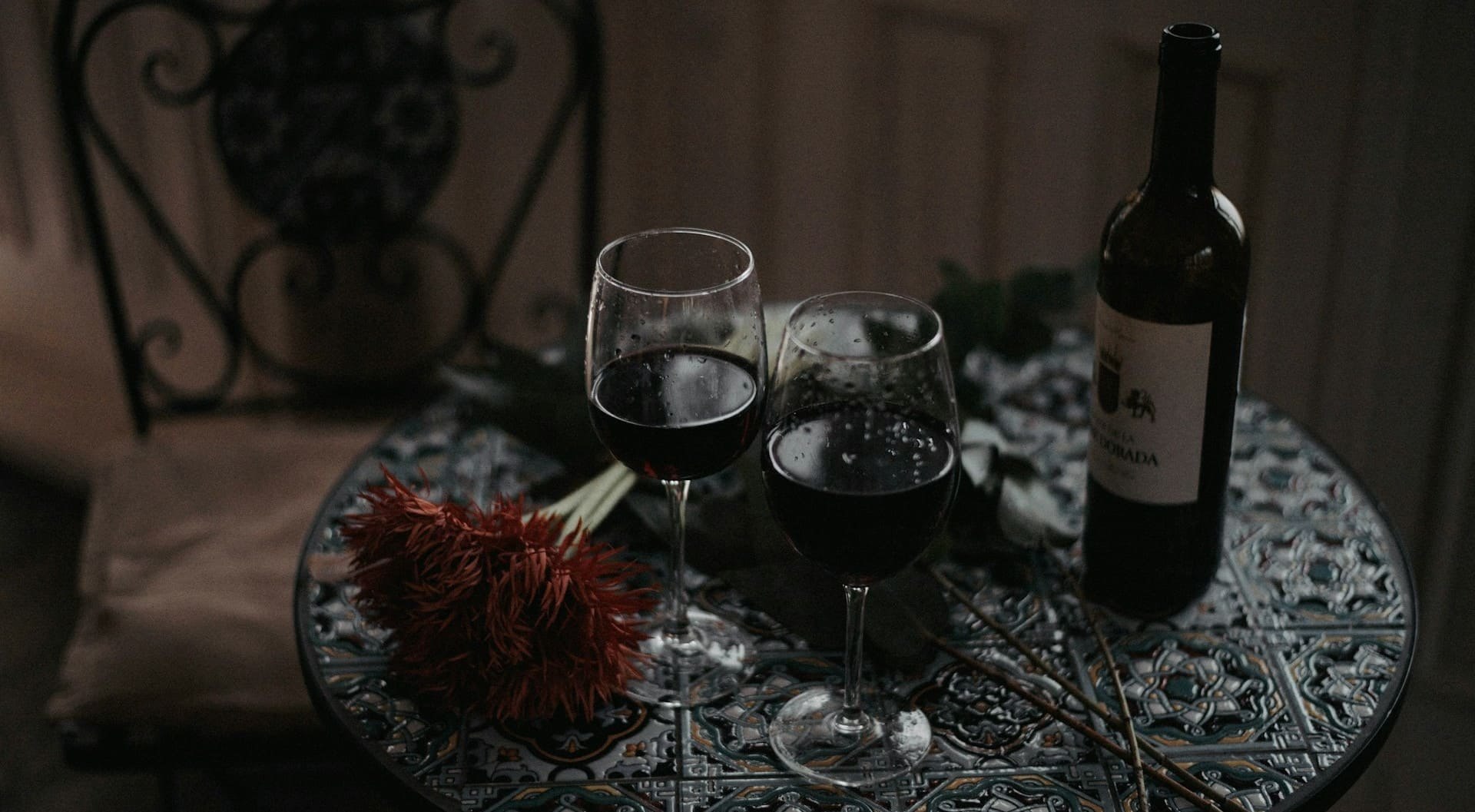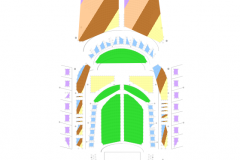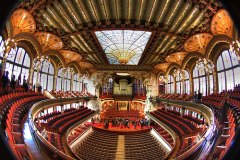La Traviata
Mo | Tu | We | Th | Fr | Sa | Su |
Synopsis
Place: Paris and its vicinity
Time: Beginning of the 19th century
Act 1
The salon in Violetta's house
Violetta Valéry, a famed courtesan, throws a lavish party at her Paris salon to celebrate her recovery from an illness. Gastone, a viscount, has brought with him a friend, Alfredo Germont, a young bourgeois from a provincial family who has long adored Violetta from afar. While walking to the salon, Gastone tells Violetta that Alfredo loves her, and that while she was ill, he came to her house every day. Alfredo joins them, admitting the truth of Gastone's remarks.
Baron Douphol, Violetta's current lover, waits nearby to escort her to the salon. Once there, the Baron is asked to give a toast, but refuses, and the crowd turns to Alfredo, who agrees to sing a brindisi – a drinking song (Alfredo, Violetta, chorus: Libiamo ne' lieti calici – "Let's drink from the joyful cups").
From the next room, the sound of the orchestra is heard and the guests move there to dance. After a series of severe coughs and almost fainting, Violetta begins to feel dizzy and asks her guests to go ahead and to leave her to rest until she recovers. While the guests dance in the next room, Violetta looks at her pale face in her mirror. Alfredo enters and expresses his concern for her fragile health, later declaring his love for her (Alfredo, Violetta: Un dì, felice, eterea – "One day, happy and ethereal"). At first, she rejects him because his love means nothing to her, but there is something about Alfredo that touches her heart. He is about to leave when she gives him a flower, telling him to return it when it has wilted, which will be the very next day.
After the guests leave, Violetta wonders if Alfredo could actually be the one in her life (Violetta: È strano! ... Ah, fors' è lui – "Ah, perhaps he is the one"). But she concludes that she needs freedom to live her life (Violetta, Alfredo: Sempre libera – "Always free"). From off stage, Alfredo's voice is heard singing about love as he walks down the street.
Act 2
Scene 1: Violetta's country house outside Paris
Three months later, Alfredo and Violetta are living together in a peaceful country house outside Paris. Violetta has fallen in love with Alfredo and she has completely abandoned her former life. Alfredo sings of their happy life together (Alfredo: De' miei bollenti spiriti / Il giovanile ardore – "The youthful ardor of my ebullient spirits"). Annina, the maid, arrives from Paris, and, when questioned by Alfredo, tells him that she went there to sell the horses, carriages and everything owned by Violetta to support their country lifestyle.
Alfredo is shocked to learn this and leaves for Paris immediately to settle matters himself. Violetta returns home and receives an invitation from her friend, Flora, to a party in Paris that evening. Alfredo's father, Giorgio Germont, is announced and demands that she break off her relationship with his son for the sake of his family, since he reveals that Violetta's relationship with Alfredo has threatened his daughter's engagement (Giorgio: Pura siccome un angelo, Iddio mi diè una figlia – "Pure as an angel, God gave me a daughter") because of Violetta's reputation. Meanwhile, he reluctantly becomes impressed by Violetta's nobility, something which he did not expect from a courtesan. She responds that she cannot end the relationship because she loves Alfredo so much, but Giorgio pleads with her for the sake of his family. With growing remorse, she finally agrees (Violetta, Giorgio: Dite alla giovine, sì bella e pura, – "Tell the young girl, so beautiful and pure,") and says goodbye to Giorgio. In a gesture of gratitude for her kindness and sacrifice, Giorgio kisses her forehead before leaving her weeping alone.
Violetta gives a note to Annina to send to Flora accepting the party invitation and, as she is writing a farewell letter to Alfredo, he enters. She can barely control her sadness and tears; she tells him repeatedly of her unconditional love (Violetta: Amami, Alfredo, amami quant'io t'amo – "Love me, Alfredo, love me as I love you"). Before rushing out and setting off for Paris, she hands the farewell letter to her servant to give to Alfredo.
Soon, the servant brings the letter to Alfredo and, as soon as he has read it, Giorgio returns and attempts to comfort his son, reminding him of his family in Provence (Giorgio: Di Provenza il mar, il suol chi dal cor ti cancellò? – "Who erased the sea, the land of Provence from your heart?"). Alfredo suspects that the Baron is behind his separation from Violetta, and the party invitation, which he finds on the desk, strengthens his suspicions. He decides to confront Violetta at the party. Giorgio tries to stop Alfredo, but he rushes out.
Scene 2: Party at Flora's house
At the party, the Marquis tells Flora that Violetta and Alfredo have separated, much to the amazement of everyone who had previously seen the happy couple. She calls for the entertainers to perform for the guests (Chorus: Noi siamo zingarelle venute da lontano – "We are gypsy girls who have come from afar"; Di Madride noi siam mattadori – "We are matadors from Madrid"). Gastone and his friends join the matadors and sing (Gastone, chorus, dancers: È Piquillo un bel gagliardo Biscaglino mattador – "Piquillo is a bold and handsome matador from Biscay").
Violetta arrives with Baron Douphol. They see Alfredo at the gambling table. When he sees them, Alfredo loudly proclaims that he will take Violetta home with him. Feeling annoyed, the Baron goes to the gambling table and joins him in a game. As they bet, Alfredo wins some large sums until Flora announces that supper is ready. Alfredo leaves with handfuls of money.
As everyone is leaving the room, Violetta has asked Alfredo to see her. Fearing that the Baron's anger will lead him to challenge Alfredo to a duel, she gently asks Alfredo to leave. Alfredo misunderstands her apprehension and demands that she admit that she loves the Baron. In grief, she makes that admission and, furiously, Alfredo calls the guests to witness what he has to say (Questa donna conoscete? – "You know this woman?"). He humiliates and denounces Violetta in front of the guests and then throws his winnings at her feet in payment for her services. She faints onto the floor. The guests reprimand Alfredo: Di donne ignobile insultatore, di qua allontanati, ne desti orror! ("Ignoble insulter of women, go away from here, you fill us with horror!").
In search of his son, Giorgio enters the hall and, knowing the real significance of the scene, denounces his son's behavior (Giorgio, Alfredo, Violetta, chorus: Di sprezzo degno sè stesso rende chi pur nell'ira la donna offende. – "A man, who even in anger, offends a woman renders himself deserving of contempt.").
Flora and the ladies attempt to persuade Violetta to leave the dining room, but Violetta turns to Alfredo: Alfredo, Alfredo, di questo core non-puoi comprendere tutto l'amore... – "Alfredo, Alfredo, you can't understand all the love in this heart...".
Act 3
Violetta's bedroom
Dr. Grenvil tells Annina that Violetta will not live long since her tuberculosis has worsened. Alone in her room, Violetta reads a letter from Alfredo's father telling her that the Baron was only wounded in his duel with Alfredo. He has informed Alfredo of the sacrifice she has made for him and his sister; and he is sending his son to see her as quickly as possible to ask for her forgiveness. But Violetta senses it is too late (Violetta: Addio, del passato bei sogni ridenti – "Farewell, lovely, happy dreams of the past").
Annina rushes into the room to tell Violetta of Alfredo's arrival. The lovers are reunited and Alfredo suggests that they leave Paris (Alfredo, Violetta: Parigi, o cara, noi lasceremo – "We will leave Paris, O beloved").
But it is too late: she knows her death approaches (Alfredo, Violetta: Gran Dio!...morir sì giovane – "Great God!...to die so young"). Alfredo's father enters with the doctor, regretting what he has done. After singing a duet with Alfredo, Violetta suddenly revives, exclaiming that the pain and discomfort have left her. A moment later, she dies in Alfredo's arms.
Program and cast
11 September 2025 and 22 January 2026
La traviata, by G. Verdi – Staged opera in two acts
Opera subtitled in Catalan, Spanish, English and in the original language.
LA TRAVIATA, the great drama of the great master Giuseppe Verdi, based on the novel The Lady of the Camellias by Alexandre Dumas son, is one of the most performed and acclaimed operas daily around the world, including fragments as brilliant and well-known as the Brindisi or the spectacular aria-cabaletta of its protagonist Sempre Libera, or the emotional finale Addio del passato.
Two-hour staged version with a 15-minute intermission. Symphony orchestra, solo singers, choir, ballet, costumes, unique lighting suited to the special characteristics of the Palau de la Música Catalana... More than 60 artists on stage!
Performers
Orquestra NovAria Filharmonia
Adolf Gassol, musical conductor
Noemí Pasquina, guest conductor (August 17)
Marta Finestres, choir conductor
Sergi Giménez Carreras, artistic direction
Ben Aisit, production and communication
Núria Serra, coreography
Cor NovAria/Ballet NovAria
Cast:
Sarah Zhai Strauss, Sara Bañeras, Maylin Cruz, Violetta Valery
Jesús Piñeiro, Sergi Giménez, Facundo Muñoz, Carlos Cosías, Oscar Encinas, Alfredo Germont
Alberto Cazes, Xavier Vilalta, Antonio Torres, Giorgio Germont
Lorena Aranda, Olha Shvydka, Flora Bervoix
Jose Cabrero, Jordi Casanova, Gastone
Néstor Pindado, Jordi Clos, Marchese d’Obigny
Alejandro Chelet, Lluís Vergés, Rodrigo Aguilar, Barone Douphol
Christian Vallester, Germán Casetti, Dottore Grenvil
Carme Gutiérrez, Sara B. Garcia, Anna Guasch, Aninna
José Luis González, Roger Vicens, Giuseppe (servo di Violetta)
Germán Casetti, Domestico di Flora/Commissionario
1 November 2025, 25 January 2026, 28 February 2026 and 2 May 2026
La traviata by Giuseppe Verdi
Josep Miquel Mindàn - Jaume Villanueva
Opera with Catalan subtitles.
A Traviata for Marcel Proust
The refined perversion of Paris, the most depraved city in the world, gravitates surreptitiously, hidden as an unspeakable and secret sin. The only plausible objective of the characters who walk through the halls, love ignored, transgression invades purity like a fog impossible to dispel. Death is the only pious —and absurd— way out that is granted to Violetta, la traviata, the lost one, object and victim of her pleasures.
Performers
Josep Miquel Mindàn, conductor
Jaume Villanueva, staging
Miquel Villalba, Pablo Morales, choir conductor
Orquestra de cambra Terrassa 48
Quim Térmens, concertino
Kevin Donaire, choreography
Mariana Giustina Baravalle, choreographies of Violetta girl
Òpera Popular de Barcelona, stable company:
Núria Vilà, Violetta Valéry
Anaïs Masllorens (January 31 and May 3), Marta Roca (February 22), Flora Bervoix, sua amica
Sara García (January 31 and May 3) Cristina Escolà (February 22), Annina, serva di Violetta
Facundo Muñoz (January 31), Beñat Egiarte (February 22 and May 3), Alfredo Germont
Xavier Vilalta (January 31), Lluís Sintes (February 22 and May 3), Giorgio Germont, suo padre
Roberto Redondo (January 31), Adrià Mas (February 22 and May 3), Gastone, visconte di Létorières
Joan G. Gomà (January 31), Alejandro Chelet (February 22), Jordi Ferrer (May 3), Il barone Douphol
Danil Sayfullin (January 31 and February 22), Néstor Pindado (May 3), Il marchese d’Obigny
Antonio Fajardo (January 31 and May 3), Lluís Vergés (February 22), Il dottor Grenvil
José Luís González, Giuseppe, servo di Violetta
Ariel Seras, Un domestico di Flora
Germán Casetti, Un commissionario
Choir and ballet of teh Popular Opera of Barcelona
With the collaboration of the Professional Dance Conservatory of the Institut del Teatre of the Diputació de Barcelona and the dance teacher Isa Moren
16 May 2026 | Cycle: Symphonic Concerts at the Palau
‘La traviata’ by Verdi
—Orquestra Simfònica del Vallès & Salado
A production by the Fundació Òpera a Catalunya.
Alongside Rigoletto and Il trovatore, La traviata forms Verdi's renowned "popular trilogy" and is one of the most performed operas worldwide.
The story of La traviata revolves around Violetta Valéry, a Parisian courtesan who falls in love with young Alfredo Germont. Despite their genuine love, their relationship is impacted by social conventions and family pressures. A strict, deeply hypocritical bourgeois morality separates her from happiness and forces her to make a great sacrifice due to the fear of society's judgment. Altogether, it is a portrait of a rotten and corrupt society hidden beneath a splendid facade, something the audience rejected at its premiere because they saw themselves reflected too harshly.
A romantic opera, clearly anticipating verismo, it tells a moving story of redemption through love involving a courtesan, with deeply expressive music that captures the characters' feelings and vividly conveys their inner drama.
Performers
Maria Miró, Violetta
Antoni Lliteres, Alfredo
Luis Cansino, Giorgino Germont
Cor Amics de l’Òpera de Sabadell
Orquestra Simfònica del Vallès
Carles Ortiz, stage manager
Andrés Salado, conductor
The Palau de la Música Catalana
The Palau de la Música Catalana is one of the most representative monuments of Art Nouveau architecture.
An emblematic building of the Catalan Modernism, declared a World Heritage Site by UNESCO in 1997.
Built between 1905 and 1908 by the great architect Lluis Domènech i Montaner, the Palau de la Música Catalana is an architectural jewel of Barcelona and essential part of any visit to the city, as any of the most fascinating Gaudi buildings.
We suggest you visit the Palau with experienced guides, to discover and The Palau de la Música Catalana is one of the most representative monuments of Art Nouveau architecture.
An emblematic building of the Catalan Modernism, declared a World Heritage Site by UNESCO in 1997.
Built between 1905 and 1908 by the great architect Lluis Domènech i Montaner, the Palau de la Música Catalana is an architectural jewel of Barcelona and essential part of any visit to the city, as any of the most fascinating Gaudi buildings.
We suggest you visit the Palau with experienced guides, to discoverand experience its wonders: a whole world of surprises and refined details of Art Nouveau architecture.
Allow us to guide you round it and to show you and explain in a fun, enriching way its history, art and other curiosities that you can discover by joining us.

 EN
EN DE
DE IT
IT FR
FR ES
ES RU
RU JP
JP RO
RO
 Seating plan
Seating plan 